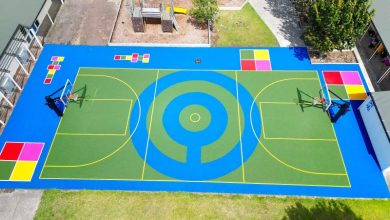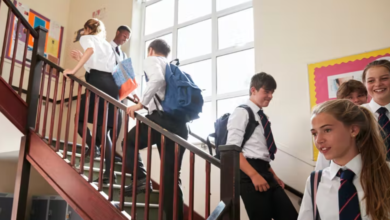
Our 16- and 17-year-olds could be voting in local elections in the very near future. But how is the education system supporting their citizenship, and could we be doing more?
In New Zealand, rangatahi bear a lot of responsibility by the time they are sixteen. At that age, young adults are legally able to drive, move out of home, be employed, consent, get married and consume alcohol (with the permission of a legal guardian). They are also able to consent to medical procedures, leave school, get a name change, apply for a passport and bear arms. But despite all these responsibilities and rights given to sixteen-year-olds, as of 2023, they’re still unable to vote. Some think this should change.
Read the Term 4 edition of School News HERE
Make-it-16 is a youth-led campaign to lower the voting age to 16. Formed from the Youth Parliament caucus in 2019, it is a non-partisan effort to lower the voting age to include 16- and 17-year-olds. In the years since, the movement has gained significant support not just among young people, but from prominent political leaders.
The Make-it-16 campaign has brought three court cases on the voting age since its inception. They were rebuffed by lower courts, only to win in the Supreme Court, which in 2022 ruled that a voting age of 18 was unjustified age-discrimination, setting a legal precedent for parliament.
But lowering the voting age is not a straightforward exercise. Any changes to electoral law, the basis of our democracy, will require a 75 percent vote in parliament, also known as a “super-majority”. However, allowing 16- and 17-year-olds to vote in council elections would only require the usual majority (51 percent). Such a bill has now been introduced to the House ahead of the general election, sparking hope that the next local body elections could see 16- and 17-year-olds have their say at the ballot.
But even if the voting age is lowered, are our young people equipped to make informed decisions in elections? Is the process of enrolling and then casting a vote well known? Are young people adequately engaged with the policies of major parties, and aware of current issues in news and current affairs? And what responsibility should our education system bear in preparing these students to vote?
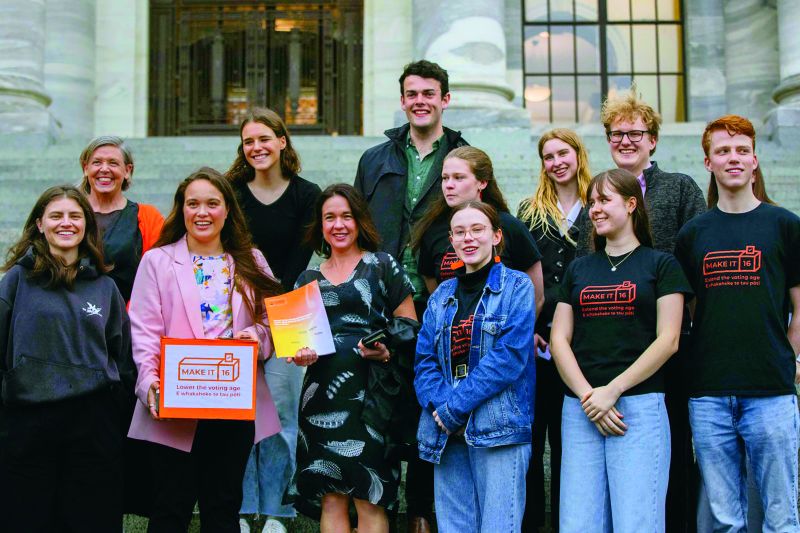
Civics and citizenship in New Zealand
In 2019, Seed Waikato conducted a digital survey which showed 40 percent of young people did not know how to cast a vote in the 2019 local body elections, and 80 percent felt disconnected from their local council.
According to the “Civics and Citizenship Education, Teaching and Learning Guide” released by the Ministry of Education in 2020, civics and citizenship education in New Zealand varies widely and we have the highest variability of civics and citizenship knowledge among young people in the OECD.
But that doesn’t mean that 16- and 17-year-olds are disengaged from politics – just the electoral process, says Make-it-16 co-chair Sage Garret.
He said he wished there was more opportunities to learn about civics and citizenship in schools, especially as young people are interested in the system.
“16- and 17-year-olds are capable and willing to engage in politics, and we’re involved in political spaces outside of the voting booth,” said Garret.
As a young person themselves, Garret said that he came to be involved with Make-it-16 through other advocacy spaces such as climate change and LGBTQIA+ organisations, where he saw other young passionate people doing work on issues they cared about, and affected their lives immensely. Public transport and council services such as libraries and parks were just some examples. Yet, despite all the work these rangatahi were doing in politics, none of them could vote.
In Garret’s experience, young people were getting involved in politics through necessity – the decisions being made by voting adults were impacting teens. Organising often happened through social media, where young people could connect with and mobilise other young people in the same position.
“Hallways are full of political discussion that we should be bringing to class,” said Garret.
Professor Bronwyn Hayward of the University of Canterbury’s Political Science department agrees, though she says we need to be careful in our approach to civics and citizenship in the New Zealand Curriculum.
“We were concerned that in the last eight years there was a growing rhetoric around focusing on civics at the expense of citizenship. There’s a focus on the facts and figures young people need to understand democracy, but not on their sense of belonging and participation or democracy as a process.”
Hayward notes that civics is a compulsory subject in the United States, but it hasn’t resulted in a more robust democracy.
“If you teach civics in that way, you tend to advantage the already advantaged child,” she said. Instead, Hayward would like to see a focus on giving young people a sense of social agency, especially for those who might come from marginalised backgrounds.
To that end, Hayward points to the recently developed School Leaver’s Toolkit, which she says is a starting point or a blueprint for a more comprehensive citizenship programme. These digital resources, compiled by the NZ government, are aimed at helping young peoples’ sense of belonging.
“It focuses on information which helps students connect with their wider community; working with other people to make change, how to pay taxes, and access healthcare.”
For educators looking to engage their young people in the processes of citizenship and democracy, Hayward suggests climate change as a point of entry. Young people have high levels of climate anxiety, and Hayward suggests this could be helped by an education in social agency.
“A lot of children take strong individual responsibility. We want to encourage people to take action together rather than feeling alone,” said Hayward.
That’s where giving young people the vote could really help. Although Hayward cautions it’s “not a silver bullet,” she believes young people having a say in local services is good for both local government and the robustness of our democracy.
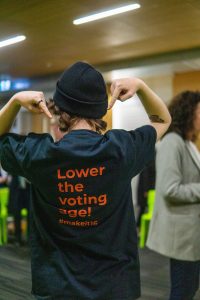
Garret agrees, saying a local youth vote could be a “catalyst” both for young peoples’ civics and citizenship education, and for a more robust democracy. He points to the extremely low voter turnout in the Auckland local elections, and notes that supporting young people into voting is more likely to create lifelong voters.
“As people can see [rangatahi] are fighting for things that matter. All people should be giving our voices a platform,” said Garret.
Lessons from Overseas
If New Zealand lowers the voting age to 16 for local-body elections, it would not be the first country to do so. Brazil lowered its voting age to 16 in 1988. In Germany, some states lowered their voting age to 16 in the 1990s, and there are now calls for the national voting age to be lowered as well. In 2007, Austria allowed 16- and 17-year-olds to vote in their national elections. Scotland and Wales have also set their voting age to 16 in recent years.
When Scotland lowered their voting age, it came into effect for the May 2016 Scottish Parliamentary election. A report released by the Scottish Electoral Commission stated that this election attracted more than 2.2 million votes, which was the highest number ever recorded for a general election in Scotland. Although younger people remained less likely to vote than older citizens, approximately 80,000 or almost 70 percent of eligible 16- and 17-year-olds registered to vote in that first national election. However, despite what is generally considered a successful and high turn-out of young voters, 16- and 17-year-olds reported having less knowledge about the election, including how to vote.
Despite this, 16- and 17-year-olds recorded a higher turnout than 18 – 24-year-olds. Follow-up studies of the 2021 Scottish election showed a lasting positive effect. Those who were eligible to vote at 16-and-17 were more likely to vote in the 2021 election compared to older cohorts who were first eligible at 18.
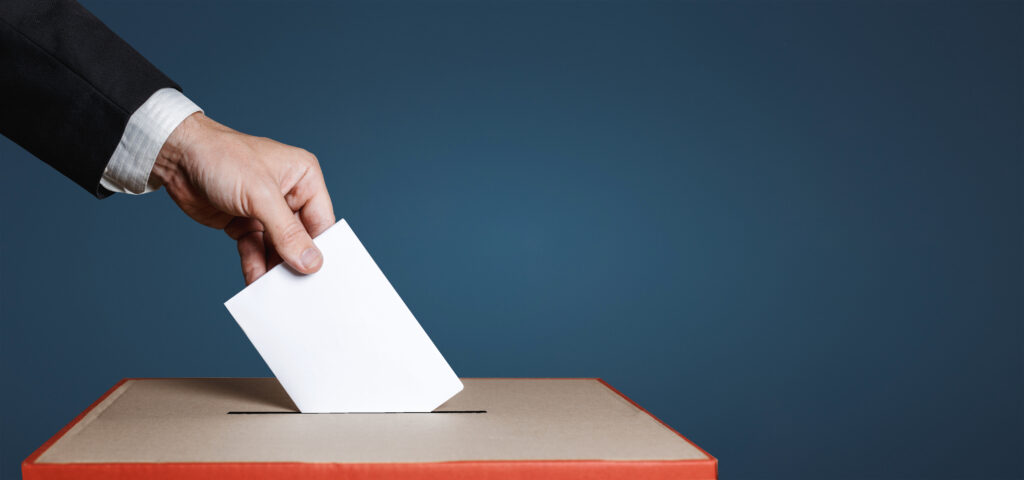
Another recent example is Wales, where the lowered voting age came into effect for the May 2021 election. In contrast to the high turnout of young voters in Scotland, the 2021 Welsh election saw only 40 – 45 percent of 16- and 17-year-olds registering to vote. However, there were a few important contextual factors at play. Firstly, the 2021 election occurred during the COVID-19 pandemic and was a “lockdown” election. Second, according to a blogpost from the London School of Economics and Political Science by electoral and political experts Thomas Loughran, Andrew Mycock and Jonathan Tonge, the Welsh elections are frequently viewed as “second-rate” and young voters stated they weren’t clear on the role and function of the Senedd and its impact on everyday citizens.
“We have found that the lack of comprehensive democratic education also impacts on the ability of young people to understand the ‘voter journey’ to the ballot box, with many having little understanding of how to get on the electoral register or how to vote,” wrote the authors.
“This lack of awareness is a barrier to younger voters, who often disengage due to anxieties about the process of voting.”
Loughran, Mycock and Tonge added that it was important that any attempt to enfranchise youth vote was accompanied by adequate resourcing, ideally a registration programme for young people in schools and other places frequented by the youth.
Overseas examples, and evidence from within Aotearoa New Zealand, then, shows that work needs to be done to enfranchise 16- and 17-year-olds beyond simply giving them the vote. Discussion, though, is sure to continue around the best way to educate all young people around civics and citizenship. Investing in this type of education will ensure all within our nation feel confident to vote, and participate fully in our democratic system. And that will surely, be beneficial for all.





